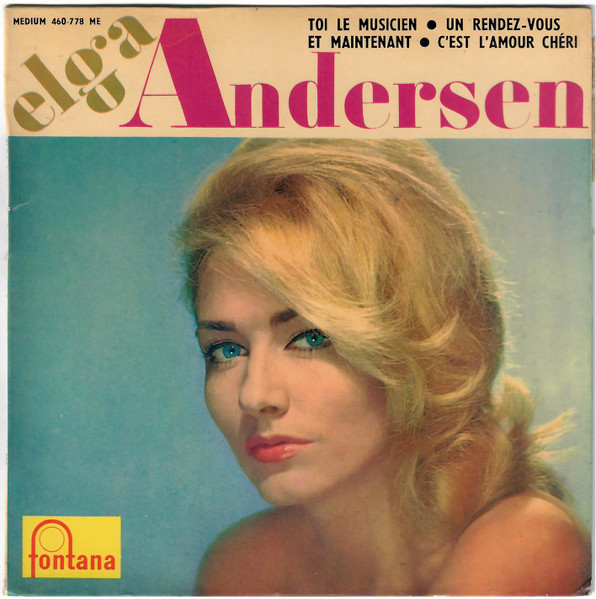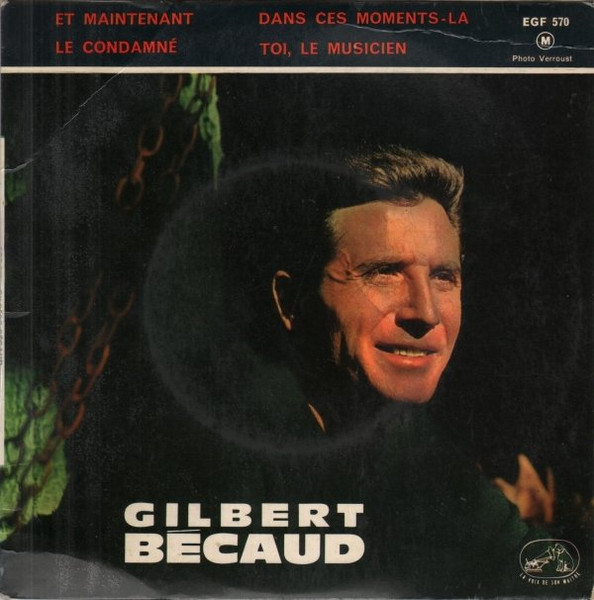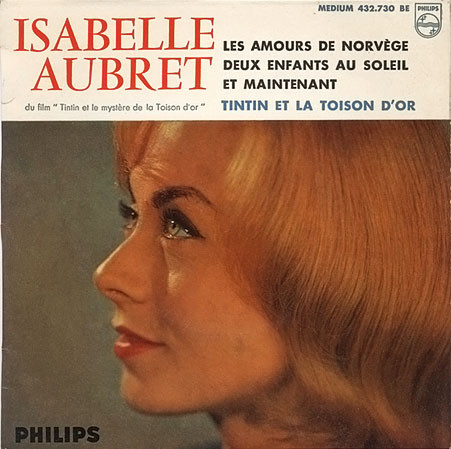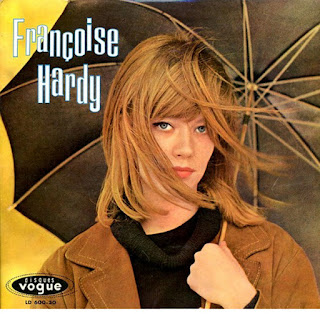Another French song that travelled the world...
This post has its origin in an article I wrote for another site, but once I'd finished it, I realised that it didn't fit the needs of the site in question. Still, no point in wasting some good research... and it does kind of fit here, so with a bit of reworking, here it is...
Inspiration can come from the strangest places. On a flight from Nice to Paris, singer and songwriter Gilbert Bécaud met the German actress Elga Andersen, who was distraught over the breakup of a relationship the night before. (Some folk dispute this, and say that she had just repaired that relationship, although that doesn't make sense in terms of what followed - anyway, as the man said in The Man Who Shot Liberty Valance "When the legend becomes fact, print the legend...".) To return to the story... as Bécaud lent a sympathetic ear, Andersen poured out her heart. "What now?" she cried, "What will happen to me now?". Bécaud didn't write lyrics but he knew a hook when he heard one...
Seated back at his piano shortly afterward, he turned the phrases over in his head and began to play, his fingers searching up and down the keyboard for the right melody to carry the song, a melody that both tugged on the heartstrings and slammed its way into the memory banks. He took the idea to lyricist Pierre Delanoë, who knew exactly what it needed. Bécaud recorded it late in 1961 and a future standard was born.
Musically, the song is decidedly unusual. The sharp, staccato, almost martial piano opening leads into a circular melody best described as a bolero, travelling around and around and increasing in intensity with each circuit. Indeed, it is hard to think of another popular hit that is remotely similar in its approach. It is however an instantly memorable tune and Bécaud's dramatic performance (what else would one expect from a performer nicknamed "Monsieur 100, 000 Volts"?) was judged to perfection, never once tripping into an oversung emotion that might easily have been employed by a lesser singer.
For all that though, it was not the monster hit that most remember it as being - ignore what you read on Wikipedia, it was never a # 1 hit in France (the dates given by Wikipedia for this feat predate its actual release!). Perhaps the timing was off - Bécaud sent it to market just as Twistmania was cresting over France and its unusual bolero rhythms were most definitely not suitable for twisters... It was certainly a hit - the sales chart in "Disco Revue" gave it a lengthy chart run that saw it peak at # 13 in the spring of 1962 while Billboard pushed it as high as # 5 - but not a smash of the magnitude that one expected of a star of Bécaud's stature.
Big hit or not, cover versions were not slow to arrive. Alongside the traditional flurry of bandleaders (Franck Pourcel and Georges Jouvin among them) were a host of singers who recognised a standard in the making - Isabelle Aubret, Jean-Claude Pascal, Jacqueline Danno. Curiously enough, it was even picked up for a French release by Elga Andersen herself, although it was fair to say that she was a better actress than singer.. The best of the covers was the version by Gloria Lasso, a Spanish singer living and working in France, whose version was a hit on both sides of the Pyrennees. The Spanish clearly took to the song better than the French had done, as Bécaud's own version hit # 1 in Spain.
But it was only when the song acquired an English lyric that it became a global phenomenon. As recorded by Shirley Bassey, "What Now My Love" soared to # 5 in the UK and remains a classic in her repertoire, prompting a host of others to follow. The song was given a brassy sheen by Herb Alpert and the Tijuana Brass, run through a sub-Spectorian folk-rock arrangement by Sonny and Cher and transformed into a soul classic by Ben E. King. Vic Dana crooned his way through it and Marianne Faithfull sang it pretty in a low key but otherwise, well, faithful arrangement. Richard "Groove" Holmes did pretty much what his name would suggest on a another hit cover while, bereft of his soultastic backing outfit, the Detroit Wheels, Mitch Ryder over-emoted his way through it. As for the bug guns, Elvis Presley gave it the expected Vegas treatment while Frank Sinatra, well, let's just say that Frank has made better records. For around a decade, the song was pretty much everywhere, and inescapable.
It's not just an English and American phenomenon.The song has been a hit in Italian ( as "Che mi faro", by Milva), in Swedish (as "Den gamla vanliga visan" by Jan Malmsjö) and in Portuguese (As "E agora" by Agnaldo Rayol and for a host of other Brazilian singers). At least ten different singers have had success with it in Spanish, under two different titles (as "Porque me dejas" by Los Cinco Latinos and by Jose Guardiola, among others and as "Y ahora que" by Lucho Gatica and by Anibal Abeena) and many other languages. Meanwhile, back in France, the covers continued when French rocker Eddy Mitchell successfully reworked it as dancefloor soul in 1966.
For all the songs success in its multiple versions, to British record buyers of a certain age, it remains Bassey's song. I remember seeing Bécaud perform it (in English) on television during the seventies, and my mother asking me, "Why is he singing Shirley Bassey's song?". "He wrote it", I replied. "But she MADE it...". Well, Mother, yes, she did and then again, she didn't. Bassey's version is great (and so is Mitchell's) but nobody quite nailed it as well as Bécaud.
A gifted composer, Bécaud would go on to pen a
number of other hits that made a successful transition into English - "It
Must Be Him", "The Importance Of Your Love", "A Little Love
And Understanding", "September Morn", "Love On The
Rocks"... but "Et maintenant" remains his calling card. In the
years since his death, his memory has faded shockingly in France - a record
dealer earlier this year lamented to me that he seemed to have been forgotten -
yet everyone remembers "Et maintenant". The artist may be gone, but
the art endures...
You can read more about GIlbert Bécaud, and many of the other singers mentioned here - and much more besides - in my book. Feel free to grab a copy here: BOOK






Comments
Post a Comment